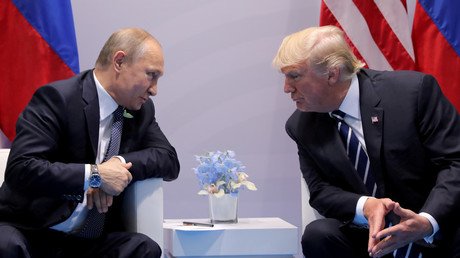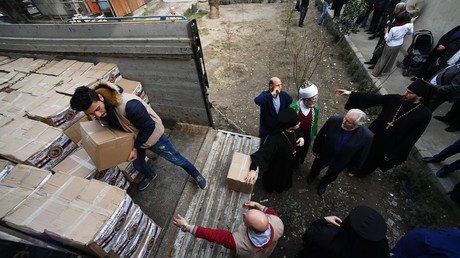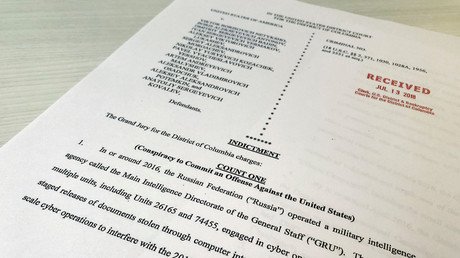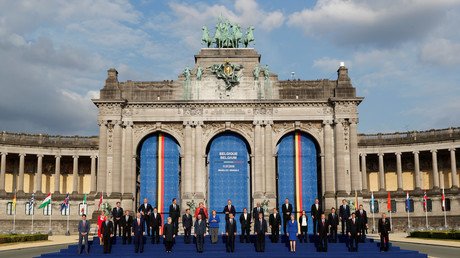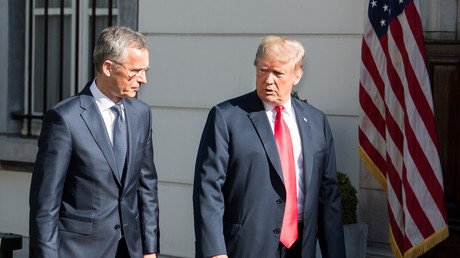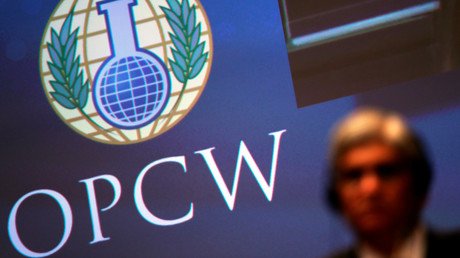What is an ideal outcome of Trump-Putin meeting? Russian FM tells Larry King
Russian Foreign Minister Sergey Lavrov has shared his view on what would be an “ideal” outcome of a Trump-Putin meeting, in an interview with Larry King that covered a wide range of topics, from Crimea to NATO and Syria.
Relations between the US and Russia are now at such a low point that a mere resumption of a normal dialog following a summit between US President Donald Trump and Russian leader Vladimir Putin could already be regarded as a success, Lavrov told the veteran TV host, on his show Politicking, aired on RT America.
The top Russian diplomat called the state of relations between the two nations “unfortunate” and said that “most channels of communications established over the last eight years have been frozen, including the ones on very important issues” such as the fight against terrorism and cyber-security.
“What we have now is sporadic meetings between diplomats and military, mostly on Syria,” Lavrov said. He then explained that if Trump and Putin would manage to “re-open all the channels [of dialog] on both divisive issues … and those issues where we can usefully cooperate” he would call such an outcome of the meeting “ideal.”
The foreign minister also said he believes that a spat in bilateral relations between Moscow and Washington began at a time when the US “realized” that Russia would not just blindly and eagerly follow the western line “on everything.” Moscow, in its turn, just wants its voice to be heard and perceived as the voice of an equal partner, he added.
US interventions left more people dead than ‘dictators’ they sought to depose
Answering a question about Russia’s continued support for Syrian President Bashar Assad, whom the West openly accuses of being a “dictator,” Lavrov said that one has to be “realistic and responsible about world security” as well as about the security of their own countries, which sometimes means cooperating with “those who would help create conditions to make our people safer.”
He also drew attention to the fact that, even though Muammar Gaddafi and Saddam Hussein were dictators, “when you compare the people’s suffering during their rule and now, following the US humanitarian intervention, then the numbers of those who were killed, wounded or [forced out] of their homes now, would be hundreds of thousands more than those who had suffered” under their rule.
"We do not justify dictators,” Lavrov said, adding that, instead, Russia wants every nation to first “take every step to ensure that your actions are not reckless” before deciding to embark on any “adventure.”
“We have to see the big picture and have to think about the price of being moral just for the sake of being moral,” Lavrov said, adding that those who “ruined Iraq and Libya, now want to put Syria in the same state.”
Ever-changing rules & double standards
However, misconceptions about Russia are far from being the only issue that complicate relations between Russia and the US, as well as other western countries which are still plagued by the legacy of the Cold War, while attempting to recklessly shape the world as they see fit.
The West “tries to invent rules of [each and every] individual case and then claims that it is unique,” Lavrov said. He went on to say that “for any other issue that they might not like there will be other rules.”
The Russian foreign minister particularly slammed Western double standards on the situation with Crimea, which reverted to being Russian following a referendum in which an absolute majority voted to rejoin Russia. He said that Crimea’s referendum, which the West still refuses to recognize, was “done in a more transparent and legitimate way than the unilateral recognition of Kosovo’s independence without any referendum.”
In the case of the Falkland Islands, the UK claimed the islands’ “status was determined in a free and fair referendum by its citizens in full accordance with the UN charter” while demanding that the sanctions imposed by Argentina over this referendum be condemned, Lavrov told Larry King, adding that, in the case of Crimea, the whole situation was suddenly treated in a totally different manner. So much for the “rules-based international order,” which the western countries would claim to be so adamantly championing.
He also criticized US actions in attempting to resolve the Ukrainian crisis. He said that a dialog between Russia and the US on the issue has virtually contributed nothing to this process, as the US actually “tries to deviate radically from the Minsk Agreements each time they meet with their Russian colleagues.”
‘Atavism of Cold War’
The minister also criticized the West’s policy aimed at further strengthening NATO, against the background of a total lack of dialog with such countries as Russia. “NATO is an atavism of Cold War times,” Lavrov said, adding that its continued condemnation of Crimea’s reunification with Russia in particular is nothing but the “inertia of Cold War thinking.”
“We do not believe what NATO is doing by trying to expand further and further closer to the Russian borders by swallowing countries that do not add anything to the security of the alliance. We do not believe that this is the way to resolve the problems of today,” the foreign minister said, adding that NATO fails to “effectively address” such issues as terrorism, climate change, drug trafficking and organized crime.
NATO, which, according to Lavrov, spends 12 times more money on defense than Russia, has yet to “understand that it cannot dictate to each and every country how to handle international security matters,” the minister said. “Dialog is required,” he asserted.
Like this story? Share it with a friend!
